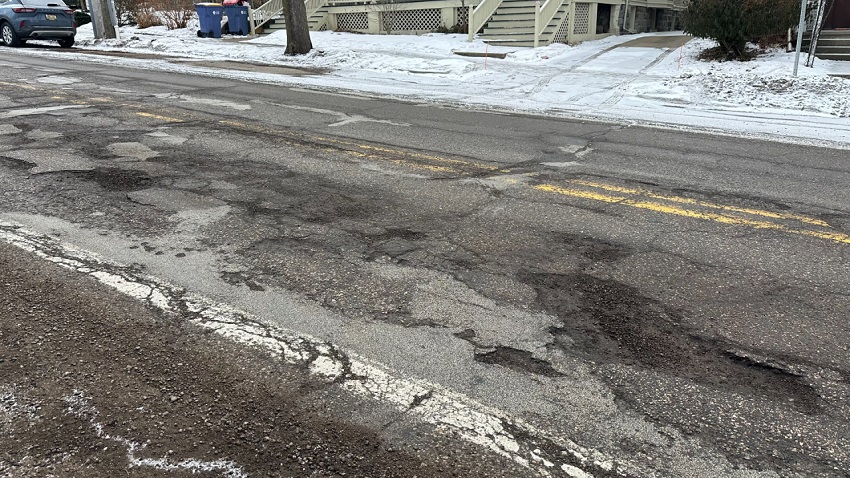Grand Rapids, Mich. — Business leaders across Michigan are expressing concerns over Governor Gretchen Whitmer’s new proposal to address the state’s aging roads and infrastructure. Announced this week, the $3 billion plan is designed to replace the road bonding initiative approved in 2020, which is set to expire soon.
The proposed funding model would rely on new taxes levied on corporations and wholesale marijuana sales, alongside a promise that every cent collected from the state’s gas tax would be dedicated to transportation infrastructure. According to the governor’s office, this could generate as much as $1.2 billion for road repairs. Additionally, $1 billion is earmarked to support local communities in fixing their roads.
Since taking office, Whitmer has made road repairs a focal point of her administration, with the state spending billions of dollars to improve infrastructure. However, Muskegon resident and truck driver Adam Hartman, who drives across Michigan daily, remains unimpressed with the visible progress.
“Honestly, I’d say the roads feel about the same,” Hartman remarked. “It seems like they’ve repaved the same highways every few years, but a lot of back roads are still in rough shape.”
Hartman highlighted his experience driving through Muskegon Heights, where he claims large potholes—some up to four feet wide—remain a persistent issue. “It feels like certain areas get more attention, where there’s money. Other areas, like Muskegon Heights, are just left behind,” he said.
Whitmer’s office contends that under her leadership, over 23,000 lane miles of roads and 1,600 bridges have been repaired. Despite these claims, the administration’s new proposal has raised questions about funding and its impact on businesses and consumers.
The marijuana wholesale tax is one of the more controversial elements of the plan. While the exact rate is yet to be determined, Whitmer’s office estimates the new tax will generate $470 million for road repairs.
Casey Kornoelje, the owner of Pharmhouse Wellness, a Grand Rapids dispensary, voiced concerns over the added burden on small businesses. He acknowledged that large, corporate dispensaries may absorb the tax, but for smaller operations like his, it could be devastating. “Cannabis is already one of the most heavily taxed industries in the country,” Kornoelje said. “Another tax doesn’t seem like the right solution.”
The plan also includes a proposal for corporations to contribute an estimated $1.6 billion for road repairs. However, the Grand Rapids Area Chamber of Commerce is worried that the tax burden on businesses—particularly small ones—could have unintended consequences.
Joshua Lunger, vice president of government affairs for the Chamber, expressed concern that raising corporate taxes could lead to higher costs for consumers, especially since 90% of businesses that pay Michigan’s corporate income tax employ fewer than 100 people.
“While we agree that fixing the roads is essential, the potential impact on businesses and consumers is a significant concern,” Lunger said.
In defense of the corporate tax proposals, Whitmer’s office emphasized that the new taxes would target large corporations and tech giants like Amazon, X (formerly Twitter), Facebook, and TikTok. These companies, the governor’s office argues, profit from Michigan’s infrastructure and contribute to road wear and tear through heavy trucking operations that damage roads and bridges.
“Michigan’s laws haven’t been updated to reflect the growing influence of Big Tech industries, which use our infrastructure without bearing the full costs of maintaining it,” Whitmer’s office stated in a release.
As the debate continues, Michigan’s road repair plan remains a focal point of state politics, with both business leaders and residents closely watching how it will unfold.








Can you be more specific about the content of your article? After reading it, I still have some doubts. Hope you can help me.
Thank you for your sharing. I am worried that I lack creative ideas. It is your article that makes me full of hope. Thank you. But, I have a question, can you help me?
Thank you for your sharing. I am worried that I lack creative ideas. It is your article that makes me full of hope. Thank you. But, I have a question, can you help me?
Can you be more specific about the content of your article? After reading it, I still have some doubts. Hope you can help me.
Outcome-focused excellence, performance excellence maintained. Achievement appreciation. Performance perfection.
Can you be more specific about the content of your article? After reading it, I still have some doubts. Hope you can help me.
Can you be more specific about the content of your article? After reading it, I still have some doubts. Hope you can help me.
Hello my friend! I want to say that this post is awesome, nice written and include almost all vital infos. I would like to see more posts like this.
I don’t think the title of your article matches the content lol. Just kidding, mainly because I had some doubts after reading the article. https://www.binance.com/es/register?ref=RQUR4BEO
Your article helped me a lot, is there any more related content? Thanks! https://accounts.binance.com/ph/register?ref=IU36GZC4
Does your site have a contact page? I’m having a tough time locating it but, I’d like to shoot you an e-mail. I’ve got some ideas for your blog you might be interested in hearing. Either way, great blog and I look forward to seeing it develop over time.
Thank you for your sharing. I am worried that I lack creative ideas. It is your article that makes me full of hope. Thank you. But, I have a question, can you help me? https://www.binance.info/es-AR/register?ref=UT2YTZSU
Heya i’m for the primary time here. I came across this board and I in finding It truly useful & it helped me out a lot. I am hoping to give one thing back and aid others like you helped me.
Your point of view caught my eye and was very interesting. Thanks. I have a question for you.
Regards for this post, I am a big big fan of this site would like to proceed updated.
Excellent read, I just passed this onto a colleague who was doing some research on that. And he actually bought me lunch since I found it for him smile Thus let me rephrase that: Thanks for lunch!
This website is really a stroll-by for all of the data you needed about this and didn’t know who to ask. Glimpse here, and you’ll undoubtedly uncover it.
Thankyou for helping out, excellent info .
Thank you for your sharing. I am worried that I lack creative ideas. It is your article that makes me full of hope. Thank you. But, I have a question, can you help me?
I genuinely enjoy looking through on this internet site, it holds wonderful posts. “A short saying oft contains much wisdom.” by Sophocles.
I really enjoy examining on this internet site, it has great articles. “The great secret of power is never to will to do more than you can accomplish.” by Henrik Ibsen.
Thank you for your sharing. I am worried that I lack creative ideas. It is your article that makes me full of hope. Thank you. But, I have a question, can you help me?